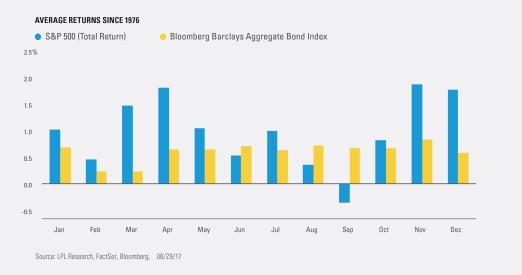by Ryan Detrick, LPL Research
September has averaged a -1% return for the S&P 500 Index since 1928*—the worst performance of any month, as noted in last week’s blog. However, although September has historically been a weak period for stocks, bonds have generally climbed, with the Bloomberg Barclays U.S. Aggregate Index gaining an average of 0.69% in September since its inception in 1976.
In recent weeks, the stock and bond market views diverged on the macro investing landscape. While stocks, as measured by the S&P 500, were back within one percent of record highs on August 29, 2017, bonds have taken a more somber view with the 10-year Treasury yield dropping to 2.13% on the same date, a level not seen since last November. Those differences will not be settled anytime soon; however, with stocks now entering a seasonally weak month, bonds may offer a temporary way to ride out the volatility.
Although we foresee an agreement being reached regarding the debt ceiling crisis, short-term Treasuries that mature near the end of September have shown a small increase in yields, indicating markets are pricing in at least some chance of a debate. In 2011, the newly elected Republican majority in Congress enacted a last-minute budget deal that avoided a government shutdown. That month, the Bloomberg Barclays U.S Aggregate Index returned 1.58%, while the S&P 500 returned -2.03%. For the full year of 2011, the S&P gained 2.11% on a total return basis, while the Bloomberg Barclays U.S. Aggregate closed the year with a 7.84% total return.
Budget and debt ceiling debates will be happening over the course of the next month, but it is too early to tell if they will take on similarities to the 2011 crisis. However even if there were no potential for political disagreements, there has been a historical seasonal pattern of weakness in stocks in September, and we continue to believe that bonds can offer a diversification benefit for portfolios, even at low yields.
IMPORTANT DISCLOSURES
*Please note: The modern design of the S&P 500 stock index was first launched in 1957. Performance back to 1950 incorporates the performance of predecessor index, the S&P 90.
The economic forecasts set forth in the presentation may not develop as predicted.
The S&P 500 Index is a capitalization-weighted index of 500 stocks designed to measure performance of the broad domestic economy through changes in the aggregate market value of 500 stocks representing all major industries.
Investing in stock includes numerous specific risks including: the fluctuation of dividend, loss of principal and potential illiquidity of the investment in a falling market.
Bonds are subject to market and interest rate risk if sold prior to maturity. Bond values will decline as interest rates rise and bonds are subject to availability and change in price.
Bond yields are subject to change. Certain call or special redemption features may exist which could impact yield.
The Bloomberg Barclays Aggregate Bond Index represents securities that are SEC-registered, taxable, and dollar denominated. The index covers the U.S. investment-grade fixed rate bond market, with index components for government and corporate securities, mortgage pass-through securities, and asset-backed securities.
The opinions voiced in this material are for general information only and are not intended to provide or be construed as providing specific investment advice or recommendations for any individual security.
Past performance is no guarantee of future results.
This research material has been prepared by LPL Financial LLC.
To the extent you are receiving investment advice from a separately registered independent investment advisor, please note that LPL Financial LLC is not an affiliate of and makes no representation with respect to such entity.
Not FDIC/NCUA Insured | Not Bank/Credit Union Guaranteed | May Lose Value | Not Guaranteed by any Government Agency | Not a Bank/Credit Union Deposit
Securities and Advisory services offered through LPL Financial LLC, a Registered Investment Advisor
Member FINRA/SIPC
Tracking # 1-640044 (Exp. 08/18)
Copyright © LPL Research














